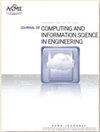多尺度计算建模中机器学习的挑战与机遇
IF 2.6
3区 工程技术
Q2 COMPUTER SCIENCE, INTERDISCIPLINARY APPLICATIONS
Journal of Computing and Information Science in Engineering
Pub Date : 2023-03-22
DOI:10.48550/arXiv.2303.12261
引用次数: 4
摘要
许多机械工程应用需要多尺度计算建模和仿真。然而,由于解空间的高维性,求解复杂的多尺度系统仍然需要大量的计算。最近,机器学习(ML)已经成为一种很有前途的解决方案,可以替代、加速或增强传统的数值方法。开创性的工作已经证明,ML提供的方程控制系统的解决方案与使用直接数值方法获得的解决方案具有相当的精度,但计算速度要快得多。这些高速、高保真的估计可以通过为传统求解器提供更好的初始解来促进复杂多尺度系统的求解。本文提供了使用机器学习进行复杂的多尺度建模和仿真的机遇和挑战的观点。我们首先概述了当前用于模拟多尺度系统的最先进的ML方法,并强调了一些具有里程碑意义的发展。接下来,我们讨论了当前ML在多尺度计算建模中的挑战,如数据/离散化依赖性、可解释性、数据共享和协作平台开发。最后,提出了未来可能的研究方向。本文章由计算机程序翻译,如有差异,请以英文原文为准。
Challenges and opportunities for machine learning in multiscale computational modeling
Many mechanical engineering applications call for multiscale computational modeling and simulation. However, solving for complex multiscale systems remains computationally onerous due to the high dimensionality of the solution space. Recently, machine learning (ML) has emerged as a promising solution that can either serve as a surrogate for, accelerate or augment traditional numerical methods. Pioneering work has demonstrated that ML provides solutions to governing systems of equations with comparable accuracy to those obtained using direct numerical methods, but with significantly faster computational speed. These high-speed, high-fidelity estimations can facilitate the solving of complex multiscale systems by providing a better initial solution to traditional solvers. This paper provides a perspective on the opportunities and challenges of using ML for complex multiscale modeling and simulation. We first outline the current state-of-the-art ML approaches for simulating multiscale systems and highlight some of the landmark developments. Next, we discuss current challenges for ML in multiscale computational modeling, such as the data/discretization dependence, interpretability, data sharing and collaborative platform development. Finally, we suggest several potential research directions for the future.
求助全文
通过发布文献求助,成功后即可免费获取论文全文。
去求助
来源期刊
CiteScore
6.30
自引率
12.90%
发文量
100
审稿时长
6 months
期刊介绍:
The ASME Journal of Computing and Information Science in Engineering (JCISE) publishes articles related to Algorithms, Computational Methods, Computing Infrastructure, Computer-Interpretable Representations, Human-Computer Interfaces, Information Science, and/or System Architectures that aim to improve some aspect of product and system lifecycle (e.g., design, manufacturing, operation, maintenance, disposal, recycling etc.). Applications considered in JCISE manuscripts should be relevant to the mechanical engineering discipline. Papers can be focused on fundamental research leading to new methods, or adaptation of existing methods for new applications.
Scope: Advanced Computing Infrastructure; Artificial Intelligence; Big Data and Analytics; Collaborative Design; Computer Aided Design; Computer Aided Engineering; Computer Aided Manufacturing; Computational Foundations for Additive Manufacturing; Computational Foundations for Engineering Optimization; Computational Geometry; Computational Metrology; Computational Synthesis; Conceptual Design; Cybermanufacturing; Cyber Physical Security for Factories; Cyber Physical System Design and Operation; Data-Driven Engineering Applications; Engineering Informatics; Geometric Reasoning; GPU Computing for Design and Manufacturing; Human Computer Interfaces/Interactions; Industrial Internet of Things; Knowledge Engineering; Information Management; Inverse Methods for Engineering Applications; Machine Learning for Engineering Applications; Manufacturing Planning; Manufacturing Automation; Model-based Systems Engineering; Multiphysics Modeling and Simulation; Multiscale Modeling and Simulation; Multidisciplinary Optimization; Physics-Based Simulations; Process Modeling for Engineering Applications; Qualification, Verification and Validation of Computational Models; Symbolic Computing for Engineering Applications; Tolerance Modeling; Topology and Shape Optimization; Virtual and Augmented Reality Environments; Virtual Prototyping

 求助内容:
求助内容: 应助结果提醒方式:
应助结果提醒方式:


